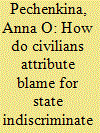| Srl | Item |
| 1 |
ID:
167281


|
|
|
|
|
| Summary/Abstract |
State indiscriminate violence against civilians has been viewed as counterproductive for the government. This conclusion hinges on the assumption that indiscriminate violence aggrieves civilians against the government even when the rebels provoke the state by using civilians as human shields. An alternative view suggests that civilians recognize if the rebels exploit them as human shields and blame the rebels if such provocation occurs. We ask: do civilians evaluate all state indiscriminate violence in the same way or do they think of state indiscriminate violence differently when it is provoked by insurgents? Accounting for the covariate differences between individuals with and without personal experience of warfare in the survey data from postwar Ukraine, we find that personal exposure to violence shapes one’s blame attribution for provoked state attacks on civilians. Individuals unexposed to violence tend to take into account whether the government was provoked by the rebels. By contrast, individuals with personal experience of warfare tend to blame the government for indiscriminate attacks regardless of rebel provocation. This finding has implications for counterinsurgency scholarship and policy. It is likely that the difference between unexposed and exposed to violence civilians emerges in geographically isolated conflicts. If so, targeting of civilians may have different effects on the escalation of insurgency in geographically concentrated as opposed to widespread cases of violence.
|
|
|
|
|
|
|
|
|
|
|
|
|
|
|
|
| 2 |
ID:
147562


|
|
|
|
|
| Summary/Abstract |
Since the end of the Vietnam War, the United States has refrained from the widespread, intentional targeting of civilian populations in times of war. Public opinion polls seem to reflect a marked decline in American support for targeting foreign civilians since that time. Drawing on original public opinion surveys, as well as other historical material, this essay explores several explanations for these changes. Although there is some evidence that the public's views about the morality of civilian targeting have shifted, I argue that two other explanations also play an important role in the changes in the conduct of American wars. First, a mounting skepticism, especially within the U.S. military, about the efficacy of killing civilians, has undercut the primary motivation to even consider such tactics. Indeed, many U.S. military leaders now perceive that killing adversary civilians in large numbers – intentionally or unintentionally – usually backfires, making the adversary fight harder or driving more civilians to join or support the adversary's forces. Second, due to the lower stakes, and especially the dramatically lower fatality rates suffered by American troops in recent wars, the temptation to attempt to end wars quickly with a “death blow” against adversary cities has become less potent. Under certain conditions, however, a majority of Americans would still support today the kind of population bombing last practiced during World War II.
|
|
|
|
|
|
|
|
|
|
|
|
|
|
|
|